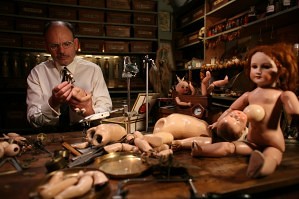 Gregoire Duval (Jean-Pierre Darroussin) is a mild-mannered pharmacist in a small town in the French countryside. The time is 1962 and, as has been going on for sometime now, the Algerian question is still rocking France. Duval is fishing along a small canal next to a dozing friend, the local police chief when suddenly; Mr. Duval hears a loud argument coming from a nearby hay barn. He watches as Khader Boualam (Lahcen Ruzougir), a young Algerian man stalks away in an angry huff.
Gregoire Duval (Jean-Pierre Darroussin) is a mild-mannered pharmacist in a small town in the French countryside. The time is 1962 and, as has been going on for sometime now, the Algerian question is still rocking France. Duval is fishing along a small canal next to a dozing friend, the local police chief when suddenly; Mr. Duval hears a loud argument coming from a nearby hay barn. He watches as Khader Boualam (Lahcen Ruzougir), a young Algerian man stalks away in an angry huff.
Curious, Mr. Duval goes into the hay barn only to find a very pretty young blonde girl putting on her dress and jewelry, she is startled when she hears Mr. Duval behind her and explains that she has just had an argument with her boyfriend but is otherwise OK.
Mr. Duval tries to comfort her. She does not want to be comforted and very quickly, this scene degenerates into an attempted rape, but when the girl starts screaming loudly, in order to shut her up, Duval strangles her to death. This murder was not really intentional, but it was not entirely accidental either. Mr. Duval returns to his dozing police chief friend just in time to catch a large carp.
Later on, we learn that the dead girl has been found and that her Algerian boyfriend has been picked up on suspicion of murder. But we know and Mr. Duval knows that this young Algerian is innocent. But truth, justice, innocence and guilt are not on the minds of the people in this town. Everyone from the local judge to the prosecutor to Mr. Duval’s wife Genevieve (played with icy menace by Isabelle Habiague) can only think about how they can exploit this crime can help further their own careers or standing in the community.
I mean, it should be a complete open and shut case, everyone knows that Boualam is hot tempered and that he probably killed the girl in a moment of passion, which, while making the crime understandable, doesn’t mitigate his guilt. The actual trial will just be a mere formality observed on the way toward a verdict of guilty for the Algerian. Then to make matters worse for Boualam, Mr. Duval is selected to be on the jury, which will have the task of listening to the evidence and coming up with a pre-ordained guilty verdict.
But here’s where Jury Duty begins to really surprise you. Since other than his defense counsel, Mr. Duval seems to be the only person in the courtroom who actually wants to prove that Boualam did not commit this murder, despite a lot of circumstantial evidence to the contrary.
So in a surprise move, it is Mr. Duval who contradicts eyewitness testimony and points out obvious flaws in the prosecutions case. It’s like having a Lieutenant Colombo as juror number seven. But, the question remains, will proving that the Algerian is innocent lead to everyone discovering that it was actually the town’s pharmacist who committed this heinous murder?
Jury Duty plunges us into the world of Mr. Duval and his somewhat distracted family with remarkable brevity and just when I thought I knew where this film was going to go next, it didn’t and went in a completely unexpected direction.
Now, I have no way of knowing if the real procedures in French courtrooms are like they are shown in film, but it doesn’t really matter, the film makes dramatic sense and put me in the peculiar position of rooting for a psychopathic killer as he tried to prove the innocence of an Algerian sacrificial lamb and alternately hoping he also gets away with murder himself.
I suppose that’s what made me feel a little bit cheated at the end and its “Hays Code” finale. Not to the point where I won’t recommend that you see Jury Duty, but I will say that the denouement is not very satisfying, but everything else that happens is funny, intense and thought provoking.
If you’re a fan of courtroom films or police procedurals or even murder mysteries, then Jury Duty will work for you. It has a great story that kept me guessing, great performances from the entire cast and a nice professional look that I appreciated. All in all, a pleasant time spent at the movies.

